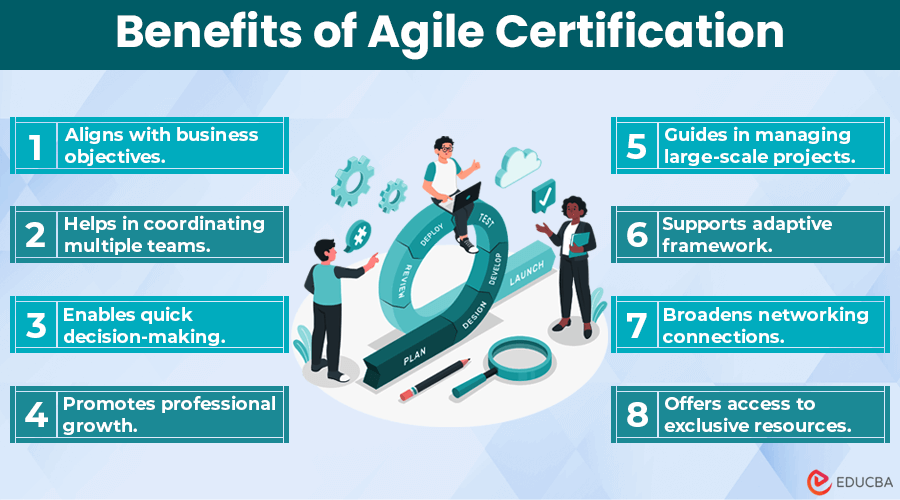
Is Agile Certification Worth It?
It has been a question for decades – Is Agile certification worth it?
The worth of agile certifications is always up for debate. Despite many criticisms and negativity, many certified holders claim that agile certifications have improved their scrum practice. Industries are increasingly adopting Agile practices, and recruiters value candidates with experience in Agile methodologies. Thus, Agile certifications are crucial in this evaluation process for freshers and experienced professionals in various team roles and work environments.
However, some certification programs require Agile professionals to have years of project management experience before enrolling. For freshers starting their careers, advanced certifications like SAFe advanced scrum master certification can be beneficial. These certifications help them pass recruiter screenings and stand out among candidates with similar experience and skills.
8 Vital Benefits of Agile Certification
If you are still wondering – Is Agile Certification Worth It? Then, let us unwrap all the benefits of Agile certification and see why SAFe certification is important.
1. Aligns With Business Objectives
Agile methodologies provide clear guidelines for developers and quality analysts on completing projects considering business objectives within the stated deadlines. They also provide guidance on aligning goals with customer requirements. In this way, they promote a centralized decision-making system that helps achieve business objectives and goals successfully.
2. Helps in Coordinating Multiple Teams
Through this certification, an Agile-certified professional will gain a strong understanding and knowledge of SAFe principles. It will help them coordinate multiple teams efficiently and ensure that work continues efficiently following the Agile framework.
3. Enables Quick Decision-Making
Handling large-scale projects requires flexibility and quick decision-making to complete them on time and in a way that aligns with customer requirements. An Agile-certified professional who has mastered all Agile concepts can make quick decisions about any dynamic modifications to meet the business objective.
4. Promotes Professional Growth
Agile certifications help you gain a competitive edge in the job market. Enrolling and gaining Agile certifications can showcase your knowledge and potential to recruiters and boost your career prospects.
However, numerous advanced Agile certifications, such as the SAFe RTE certification, require years of prior experience to enroll in this course. This way, the candidate possesses the necessary skills and understanding of Agile methodologies before enrolling.
5. Guides in Managing Large-Scale Projects
Agile certifications will build your ability to handle complex projects on a large scale. The training you get through the Agile course program will build your confidence to work with a team irrespective of their size.
6. Supports Adaptive Framework
The Agile certification teaches professionals how to customize an Agile framework according to organizational structures, promoting flexibility. This means that professionals with these skills can upgrade or downgrade the framework as required, which is a valuable skill.
7. Broadens Networking Connections
The Agile certification often includes one year of free membership to the professional community, thereby improving your networking opportunities. You will connect with like-minded professionals working in similar Agile development networks. Moreover, you can share your thoughts and experiences with the community while gaining insightful advice for a successful career path in the Agile framework.
8. Offers Access To Exclusive Resources
Lastly, certified professionals will gain access to plenty of exclusive resources, such as learning materials, that help them stay ahead in the competitive job market. Thus, earning Agile certifications is a great way to advance your career path.
Key Factors for Evaluating Agile Certification Value
1. Trainer Quality
Your instructor or trainer plays a key role in deciding the worth or value of your certification. For example, in a two-day training course, the trainer should teach you a complete understanding of Agile using Agile methods to grasp the concepts. Also, the trainer should help you understand what Agile is, how it works, and how to apply it effectively in your role. Therefore, choosing a course with a good trainer is important to make the certification worth it.
2. Course Training Type: Public or Private
There are two types of Agile courses in the market: public and private. Your choice depends on your needs. Public training is the right choice for meeting Agile practitioners from different companies and sectors during the training program. These courses are open to anybody, depending on the seat availability.
On the other hand, private Agile training courses address specific challenges your organization or team faces. Compared to public courses, the instructor here can deliver tailored solutions to your business Agile challenges and answer all your questions during the course program.
3. Group Dynamics
Agile certification training happens in groups, and the content of your training group can significantly impact the training’s worth. You might struggle with advanced-level questions and concepts if you are a fresher in a group of experienced Agile professionals. Likewise, the training may not meet your expectations if you are a senior member joining a fresher. Therefore, group dynamics are necessary before enrolling in the course.
Final Thoughts
It has become important for aspiring students and professionals to learn new skills according to industry standards. One way to do this is by earning Agile certifications to build a career in the Agile industry. Moreover, certifications not only demonstrate your potential to the employer but also help you grab a higher pay scale.
Recommended Articles
We hope this article answers your questions: Is Agile Certification Worth It? To learn about similar concepts, read the suggested articles.

